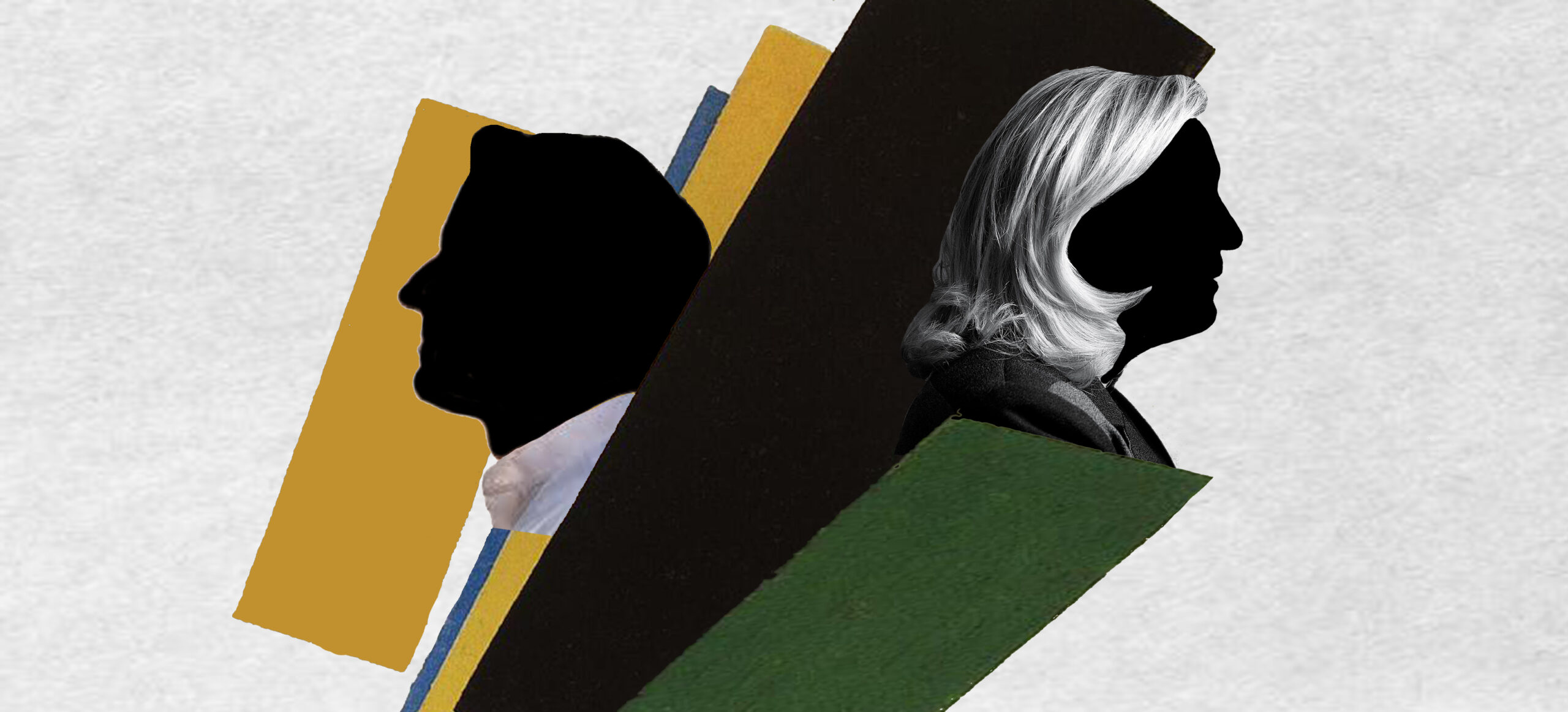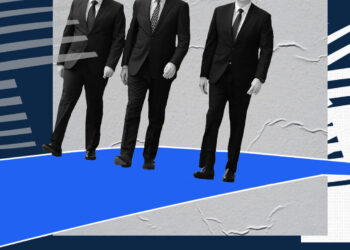
On April 11, 2022, as was expected by polls, the French electorate advanced the same two candidates to the second round of their presidential election as they had in 2017. Either Emmanuel Macron or Marine Le Pen will win the final contest on April 24. The results deepened the restructuring of the political landscape that began five years ago, when Macron’s La Republique En Marche party first splashed onto the scene. What implications will this vote have for the large Armenian community in France?
A Crumbling Left-Right Divide
The main fault line is no longer between the right and the left; the old bipartisan system is over because the main two traditional parties have collapsed. The three poles that stood out in the results of the first round were those of the outgoing “centrist” president, the “far-right” candidate Marine Le Pen and the “radical left” candidate Jean-Luc Melenchon. The trio represent the new streams of the French political landscape. Gone are the days when two dominant center-left and center-right parties dominated the scene. For a country in an identity crisis, like many other democratic societies, each candidate presents a different ideological vision and a particular understanding of France’s relationship with the world. President Macron has championed a pro-Europe and pro-globalization optimistic liberalism (economic and cultural liberalism). Marine Le Pen embodies the protective withdrawal (economic and cultural protectionism) of Donald Trump and other populist leaders of Central and Eastern Europe. Jean-Luc Melenchon preaches revolution (economic protectionism and cultural liberalism).
At the end of a dull campaign, overshadowed by the war in Ukraine, there is an urban France that feels it has successfully integrated into a globalized world, and it contrasts with the more rural west of the country, which worries about a downgraded quality of life and the loss of identity markers they are accustomed to.
Instead of two centrist forces constituted by the socialists and the liberals, we now have three forces. Two at the far end of the spectrum and one in the middle. The question of identity has become ever more salient through the campaigning of former journalist Eric Zemmour. His views on the extreme right have made Marine Le Pen seem moderate in comparison. Voting for Emmanuel Macron, the “party of power”, is a vote of confidence in the status quo. The elderly, mostly wanting continuity and stability, have massively mobilized for the young outgoing president; whereas young people from the cities tend to prefer Melenchon. In total, the voices of the center, the center-right and the center-left, which have common ground in defending the European project and social liberalism, total 28.3%. They are up against the 45.2% of votes cast in the first round in favor of protest candidates from the extreme right and extreme left. Where do French voters of Armenian origin find themselves in all of this?
Armenia as Object or Subject?
Eric Zemmour’s visit to Armenia in December 2021 was an opportunity for the far-right identity candidate to make Armenia a backdrop for his clash of civilizations rhetoric. His radical speech does resonate with a portion of the French Catholic right in search of benchmarks. But despite the strong proximity of this candidate of Algerian Jewish origin with the lawyer of Azerbaijan in France, Oliver Pardo, this speech garnered growing support within the Armenian community of France. If there is no singular Armenian vote in France, the French of Armenian origin reflect the wider French society: they are shifting more and more to the right. Moreover, we seem to have forgotten that, until the end of the 2000s, the Armenian Cause was largely defended by left-wing political figures, especially the Socialist Party. The right flank, the heirs of Gaullism, had blocked any resolution recognizing the genocide of 1915 for fear of offending Turkey. This trend reversed during the presidency of Nicolas Sarkozy (2007-2012), which corresponds with the appearance in the political debate and the media of the question of the “Christians of the East” of Iraq, Syria and Egypt, that were being threatened by Islamic fundamentalism. In this debate, the Armenians were gradually absorbed into the grouping of the Christians of the East. The 44-day war in Artsakh confirmed this trend; two-thirds of the French political figures taking up the defense of Artsakh were on the right and sensitive to the theme of Eastern Christians. In doing so, Armenia and Armenians remain not subjects but objects. This is a position defended by the candidate of the center-right post-Gaullist party, Les Republicains, Valérie Pécresse, who had had the courage to go “clandestinely” to Stepanakert in December 2021 before receiving threats from President Aliyev. Though, these threats do not particularly move the French political class or the Ministry of Foreign Affairs.
In a long interview to the monthly magazine Nouvelles d’Armenie, President Emmanuel Macron, who was absent from the annual Coordination Council of Armenian Organizations in France (CCAF) dinner because of the Ukrainian crisis, assured “France’s unwavering support and its mobilization to continue to exert pressure… for the conclusion of a peace treaty respecting the requirements of security and dignity… “, without ever denouncing the Armenophobic, racist policy of Azerbaijan, which will stop at nothing to carry out its project of ethnic cleansing in Artsakh. The war in Ukraine has also caused a resurgence of Azerbaijani influence in France, thanks to the promise of an alternative to Russian gas (even if such promises are exaggerated).
For her part, Marine Le Pen, who has never distinguished herself by her support for the Armenian Cause, had spoken in favor of the integration of Artsakh into Armenia, and stood up for the defense of the territorial integrity of Armenia, when it was threatened by Azerbaijan. This does not prevent her from including Thierri Mariani, a former cabinet minister known for his role as a pro-Azerbaijan lobbyist, on her team, however.
A Scheduling Problem
Faced with the restructuring of the French political landscape, it is clear that the organized Armenian community did not anticipate how they would prepare for such a scenario. The strong proximity between the French branch of the Armenian Revolutionary Federation (ARF) and the dying Socialist Party, or that of the Armenian bourgeoisie with Les Republicains now seem immaterial, as both parties were rendered to the political margins in the first round on April 10. There is no centrist Armenian political force capable of gravitating around Emmanuel Macron’s team. While Paris maintains the illusion that an OSCE Minsk Group still exists, pressure from the Armenian community for France to reconsider its position of neutrality has not borne fruit. It would therefore be appropriate to rethink the usefulness of the presence of France as a Co-Chair of the Minsk Group. Doesn’t Armenia have more to lose than to gain from this French co-chairmanship? It is precisely this French co-chairmanship that forces Paris to opt for a position of absolute neutrality and impartiality, a position that above all benefits Azerbaijan, because Baku does not traditionally have other levers of influence on the French government. But for Paris to be able to change its position and offer something other than humanitarian and cultural cooperation to Armenia, the Armenian organizations in France still need to have an agenda and a clear vision for the future.
The difficulty of representing the realities in Armenia and Artsakh, the strong polarization caused by the shock of the defeat and its deleterious consequences on the Armenian political class, have weakened the French diaspora, the most politicized in the Armenian world. Neither left nor right, it is time for the Armenian question to become again in France a trans-partisan humanist cause, a tool at the service of France’s influence in the South Caucasus and the Middle East. For this wishful thinking to become reality, the leaders of Armenia and the diaspora face a historical responsibility and the need to mature politically.
Also read
The Dilemma of Armenian-Turkish Relations
Since Armenia’s independence, every administration has been involved in some form of negotiations with Turkey to normalize relations. Hranoush Dermoyan looks back at the diplomatic history between Armenia and Turkey since 1991.
Read moreThe EU’s Dining Diplomacy and the Armenia-Azerbaijan Reconciliation Process
The leaders of Armenia and Azerbaijan met in Brussels on April 6, 2022, on the initiative of the European Council president. Why is the EU taking an interest now when it was a mere observer during the 2020 Artsakh War?
Read moreThe Weakening of the Leviathan: Armenia, Russia, and the Consequences of the War in Ukraine
The impossible situation that Armenia finds itself in because of the Russo-Ukraine conflict can be mitigated through a policy known as strategic shirking, argues Nerses Kopalyan.
Read moreAre There Alternatives to Delimitation and Demarcation of the Borders?
Reckless steps or imposed decisions regarding demarcation and delimitation, which are part and parcel of the so-called peace treaty between Armenia and Azerbaijan, might bring unintended historical consequences for the future of Armenia.
Read more




